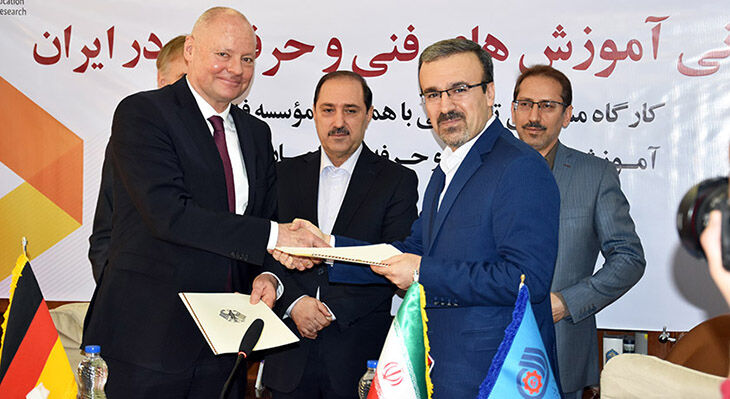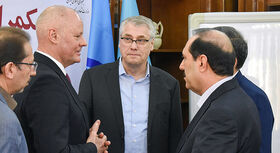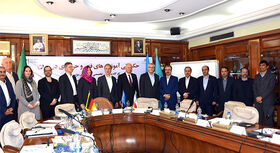BMBF and the Iranian Ministry of Labour sign a Joint Declaration of Intent
GOVET will advise Iran on planned VET reforms. The relevant ministries signed a Joint Declaration of Intent on future German-Iranian vocational education and training cooperation at a workshop in Teheran which GOVET helped to organise.

In February 2019, the Iran Technical & Vocational Training Organization (TVTO) and GOVET staged a joint workshop. Professor Friedrich Hubert Esser travelled to Teheran at the invitation of the TVO. He was accompanied by representatives from the Federal Ministry of Education and Research (BMBF) and by an expert delegation from BIBB’s international department. The purpose of the meeting was to network with the “High Council of Technical and Vocational Education and Training” (High Council of TVET) on the German dual system and on Iranian vocational education and training reforms. During the workshop, the BMBF and the Ministry of Cooperatives, Labour and Social Welfare (MCLS) signed a Joint Declaration of Intent on German-Iranian VET cooperation. The Iranian Minister of Labour Mohammad Shariatmadari, TVTO President Dr. Soleiman Pakseresht and the German Ambassador Michael Klor-Berchtold were all present. They were joined by representatives of the High Council of TVET’s member organisations.

“The reform projects initiated by the Iranian Government at the end of 2017 represent a serious endeavour to develop VET further. The proposals made regarding a standardised vocational education and training system are very promising. Strengthening cooperation between the state, trade and industry and civil society is in particular an approach that has been traditionally adopted in Germany, and this has always been an important success factor for the structuring of vocational education and training”, explained BIBB President Esser in his keynote speech at the opening of the joint workshop.
One of the major focuses of the Iranian reform plans is the establishment of a “High Council of Technical and Vocational Education and Training”. The aim is that ministries, other government representatives and delegates from the chamber organisations will use this body as a vehicle for consulting on central issues regarding governance and further development of vocational education and training in Iran. Enhanced cooperation is being pursued with a view to increasing the employability of young Iranians and to ensuring that the training of skilled workers meets the requirements of trade and industry.
“The TVTO has asked us to advise on the development of the High Council,” Professor Esser stressed. This is something which we are seeking to support. We will be drawing on the experiences we have gained from working in conjunction with economic and social partners on the structuring and further development of the dual system but will also be using the knowledge we have obtained on precisely these topics from our involvement in international cooperation. The idea is that this will then serve as a basis for generating impetus for the development of an Iranian approach.”
The workshop jointly prepared by GOVET and the TVTO initially concentrated on outlining the reform processes in Iran. The main focuses were on previous involvement in vocational education and training by Iranian stakeholders and on opportunities for closer collaboration that would be conducive to the creation of a holistic VET system in future. The Iranian side exhibited considerable interest in German experiences of the dual system. The hosts also indicated a readiness to enter into open dialogue with German partners on the reform needs of their vocational education and training system. A major role in this regard will be played by the Secretariat of the “High Council of TVET”. The intention is that it will coordinate cooperation between Iranian VET stakeholders.

A Joint Declaration of Intent signed by the BMBF and MCLS on 7 February 2019 will constitute the political framework for German-Iranian cooperation. This is the outcome of extensive talks which have taken place regarding the expansion of German-Iranian VET cooperation. The offering of consultancy services by GOVET was agreed, as was continuation of cooperation with iMOVE at BIBB, which assists German education and training providers to enter the market in Iran.
Cooperation in vocational education and training between Germany and Iran has been revived since 2016, following the end of sanctions imposed on the latter. The “Iran Innovates” project was launched in September 2017 with the aim of initiating innovation processes in vocational education and training in Iran. The project is being implemented at the Centre for Initial and Continuing Vocational Education and Training in conjunction with the University of Leipzig. The objective of the project “CC Iran” is to work jointly with Iranian partners to bring about an improvement in the initial and continuing vocational education and training of mechatronics technicians for refrigeration technology. The project partners in this case are the Information Centre for Refrigeration, Air Conditioning and Energy Technology and the Institute for Innovative and Preventive Job Design. The project has been running since August 2017. Both of the above projects receive funding from the BMBF.
Since October 2017, the Federal Ministry for Economic Cooperation and Development has been financing a VET partnership between the Training and Craft Trades Foundation (SBH) and the Iran Chamber of Commerce and Industry, Mines and Agriculture in which the TVTO is also involved. Within the scope of the project, the SBH is advising its Iranian partners on how trade and industry and the government can work together to introduce elements of dual VET. The project programme also included a study trip to Germany and a visit to GOVET in February. During the trip, participants took part in a workshop with GOVET at which there was an opportunity to network on issues such as the costs and benefits of dual vocational education and training.